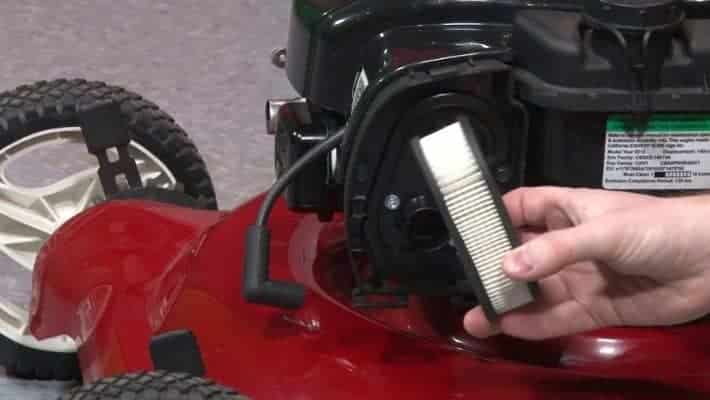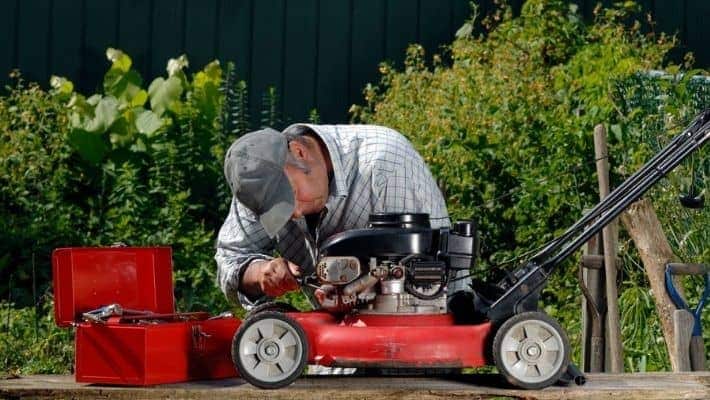Last Updated on April 1, 2024 by Sharaj
An air filter is an essential part of the lawnmower to ensure your mower’s engine is always clean and gets dirt-free air.
Air filters help filter out any dirt particles, debris, and any other small particles to give your clean lawnmower air and optimise its combustion and function.
So, what do you think will happen when you run your lawnmower without an air filter?
Can You Run A Lawnmower Without an Air Filter?
This is a big No! You should never try to run your lawnmower without a filter in place. Why? Because the absence of a filter means that the lawnmower will suck in dirt and debris along with the air.
Also, there will be no regulation on the amount of air that enters the engine. And once the air is too high, it affects the fuel-air ratio which is harmful to the engine. Causing it to fun less efficiently.
However, if for any reason, let’s say you want to check a problem or something is wrong with the lawnmower. And you have to run the lawnmower without an air filter, ensure you do it while the lawnmower is stationary. In this instance, it means debris or harmful particles won’t enter the mower.
The air filter is a very important part of the engine and as such, you should take regular care of it. Regular cleaning and replacing of bad parts, frequent checking and maintenance when needed.
What Happens If I Run My Lawnmower Without an Air Filter?
When you run your lawnmower with the absence of a filter, it will work but at the expense of your engine. As there will be nothing stopping small debris and harmful particles from entering the engine. And over time, this will surely cause problems for your lawnmower.
Below are some common issues that can affect your lawnmower when you run it without an air filter.
The absence of an air filter reduces the life expectancy of your lawnmowers’ engine: This has to be one of the most important reasons why you should never run your lawnmower without an air filter. The dirt and small particles that get into the engine damage it and reduce the engines’ life.
Inside your lawnmowers’ engine is an enclosed cylinder that houses the pistol. And this pistol should never come in contact with any external particles. As it will lead to early wear and tear and finally a complete failure of the engine.
Lack or reduced power from the lawnmower: Lawnmowers usually come with a small engine that is not meant to produce large power. So, when you use your mower without the air filter, you tend to overwork the engine. This leads to the engine running slower and working inefficiently. Also, the engine may backfire which affect the overall performance.
Difficulty in starting the lawnmower: For efficient and complete combustion to take place, your lawnmower needs a perfect ratio of fuel to air. The absence of an air filter means the air entering the engine is not regulated. It enters it quickly and this can cause difficulty in starting the mower. And even when you finally get it to start, it may misbehave and keep shutting down frequently.
From the above reasons, you can see that there is no good in using your mower without and air filter. Moreover, air filters are affordable and quite easy to install. SO why go through all the trouble instead.
How to Replace and Install a Lawnmowers’ Air Filter?

It’s no rocket science replacing and installing your air filter. It’s so straightforward, anyone can do it and you might not even need any special tools. However, ensure you have the correct parts that fit your lawnmowers’ type and brand. As incorrect parts can lead to leakages and allow dirt and debris to enter your engine.
Below are the simple steps you need to replace and install an air filter in your lawnmower.
1. First Disconnect the sparkplug: Disconnecting the sparkplug ensure that the lawnmower doesn’t start up suddenly during the installation. Ensure that the sparkplug wire is securely tucked away from the spark plug to prevent contact and sudden starting.
2. Find the Air filter: Most lawn mowers come with their air filter enclosed in a metal or plastic cover at the side of the engine. Usually secure with clips or bolts depending on the brand.
3. Open the cover and remove the air filter: Open the cover and remove the air filter. And depending on your lawnmowers’ brand, it may come with a foam pre-cleaner. However, don’t fret if yours doesn’t have the foam, as not all do.
4. Clean the air filter housing: Using a cloth, you should clean out the air filter housing to remove any dirt and debris. Since most air filter house cover comes in plastic, you can wash them under running water. However, ensure that the cover is dried before putting it back.
5. Put the new air filter and pre-cleaner in the housing: When putting back the air filter, ensure that the flat end is pointing inwards towards the engine while the pointy ending with the screw hole is pointing outwards. Once this is done, ensure that everything fits perfectly and replace the air filter cover.
When to Clean or Replace your Lawnmowers’ Air Filter?
Irrespective of what your lawnmowers’ air filter is made of (foam, paper or combination), it should be replaced at intervals. Most manufacturers recommend that air filters be replaced after 25 hours of usage or every 3 months. And with regular maintenance, the pre-cleaning foam can last up to 100 hours.
Even if you don’t use your lawnmower frequently, it is advised that you replace the air filter every season.
Signs that tell you it is time to change your air filter
Below are some signs you should look out for to know when your air filter needs replacement.
- Excess fuel usage and
- Engine not running smoothly
Conclusion
Without any doubt, the air filter is an integral part of the lawnmower that allows it to run smoothly and efficiently.
Without it, your engine won’t last long and its overall function will be impaired. But regular cleaning and maintenance, your lawnmower is sure to last you for a long time.

